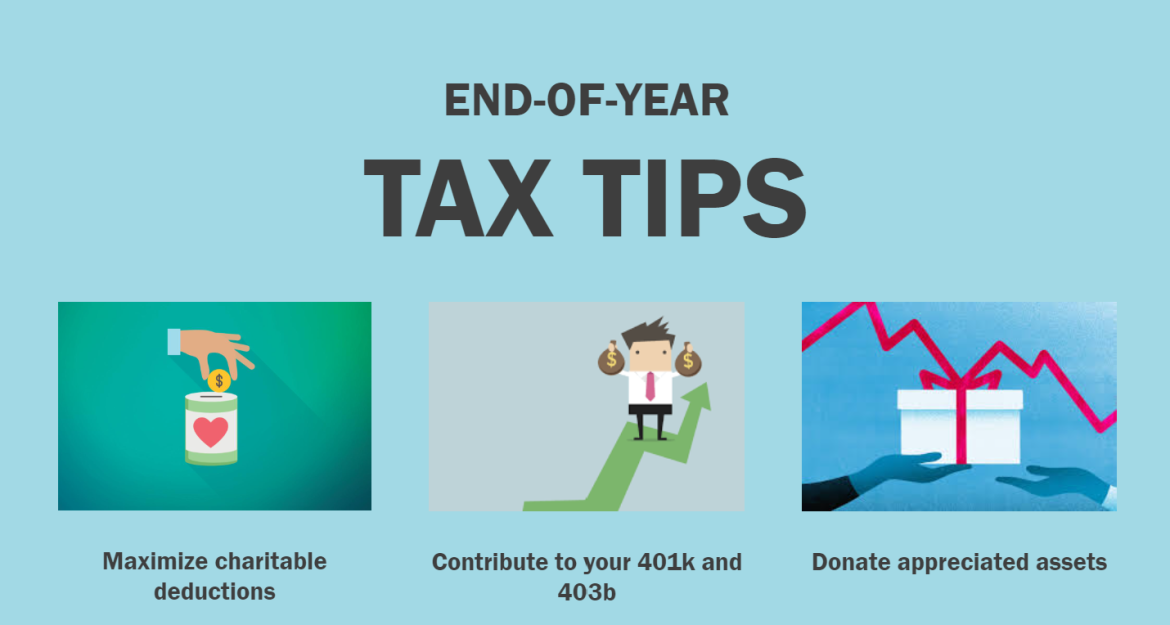Year-End Tax Planning Tips For 2023
As the year draws to a close, engaging in some year-end organizational tasks can have the dual benefits of reducing your taxable income and optimizing charitable deductions, while also mitigating exposure to future taxes.
Lowering Taxable Income
As the year concludes, it’s an opportune moment to assess available avenues that can be leveraged to retain more of your earnings. Here are strategies to consider:
- Tax-Loss Harvesting: Offset gains by selling depreciated securities that no longer align with your strategy, have limited growth prospects, or can be replaced with similar investments.
- Contributions to Tax-Advantaged Accounts: Review and maximize contributions to accounts like 401(k), 403(b), or health savings accounts to potentially decrease taxable income for the current year and bolster assets for future retirement and medical expenses.
Maximizing Charitable Deductions
Giving is rewarding, and there are ways to make it tax-efficient. Here are strategies based on existing laws:
- Bunching Charitable Contributions: Consider making multiple years’ worth of contributions in one year to itemize deductions, as opposed to spreading them over several years.
- Donating Appreciated Assets: If itemizing deductions, donating assets held for over a year to a qualified charity can yield a deduction for the asset’s fair market value without incurring capital gains.
- Cash Contributions: For itemizers, remember that up to 60% of your adjusted gross income (AGI) can be deducted for cash contributions to qualified charities in 2023.
Reducing Exposure to Future Taxes
Year-end planning extends beyond immediate concerns. Consider these actions to prepare for future tax implications:
- Lifetime Estate and Gift Tax Exemption: Take advantage of the substantial inflation-adjusted increase in the lifetime estate and gift tax exemption for 2023, providing an additional opportunity to move assets out of your estate.
- Annual Exclusion Gifts: Gift up to $17,000 to multiple beneficiaries to reduce your estate’s value without utilizing your lifetime gift and estate tax exemption.
- Qualified Charitable Distributions: Individuals aged 70½ or older can make direct transfers from their IRA to eligible charities, potentially reducing current or future required minimum distributions.
- IRA or 401(k) Distributions: Consider taking distributions, particularly if your income is relatively low this year, anticipating potential future tax rate increases.
- Roth IRA Conversions: Evaluate the benefits of converting to a Roth IRA before 2026, when income tax rates may revert to 2017 levels.
Maintain a long-term perspective and consult with a tax advisor to determine the best approach for your specific situation. Understanding the possibilities enables the creation of flexible plans aligned with your long-term goals and objectives.
|
PHILIP LOCKWOOD | FOUNDER + MANAGING PARTNER |
|
ADDRESS: 1501 INGERSOLL AVE. SUITE 201 DES MOINES, IA 50309 PHONE: 515-274-8006 |
|
EMAIL: PLOCKWOOD@PARKLANDREP.COM WEBSITE: LOCKWOOD FINANCIAL STRATEGIES
Securities offered through Parkland Securities, LLC, member FINRA (FINRA.org) and SIPC (SIPC.org). Investment Advisory services offered through SPC, a Registered Investment Advisor. Lockwood Financial Strategies, LLC is independent of Parkland Securities, LLC and SPC
Securities offered through Parkland Securities, LLC, member FINRA/SIPC.
|


